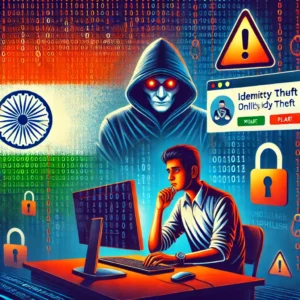Online Identity Theft in India: 10 Simple Ways to Protect Your Personal Data (2025 Guide)

In 2023, India saw about 1.1 million cases of identity theft, a 15% jump from the year before. With half of internet users facing online identity theft, protecting your data is more important than ever. As we get closer to 2025, knowing how to prevent identity theft is key to keeping your personal info safe from cyber threats.
This guide shows 10 simple ways to protect your personal data. Learning about the risks and using strong identity theft prevention methods can greatly reduce your risk. Phishing scams, which cause nearly 70% of identity theft in India, and unsecured public Wi-Fi are major threats. Staying informed is your best defense.
Using cyber security services and knowing how to manage your personal info are crucial. This guide will help you take steps to improve your online privacy solutions.
Key Takeaways
- Identity theft cases in India have risen sharply, highlighting the need for vigilance.
- Nearly 70% of identity theft incidents stem from phishing attempts.
- Assuring strong passwords can reduce unauthorized access risks significantly.
- The importance of using two-factor authentication cannot be overstated.
- 80% of online transactions could expose personal data to theft.
- Only a minority of individuals regularly monitor their financial accounts for discrepancies.
Introduction
Digital transactions and online activities have made identity theft a big problem. In India, about 21,796 cybercrimes were reported in 2017. This shows how serious the issue is. Identity theft can cause big financial losses for people and businesses, making online protection very important.
New technologies, like generative AI tools, help cybercriminals create better scams. They aim to get personal information from people. This makes it crucial to stay aware of identity theft in our digital world.
Phishing is a common way scammers trick people. In India, identity theft can lead to jail time of up to three years. This highlights the need for better digital security and online safety.
Every internet user needs to protect their personal data. This is because more digital interactions mean more chances for hackers to find weaknesses. Keeping your information safe helps you and makes the internet safer for everyone. India has laws like the Information Technology Act and the Indian Penal Code to fight these threats. But, more laws are needed to keep up with new risks.
What is Online Identity Theft?

Online identity theft happens when bad guys use someone else’s personal or financial info without permission. This is a big problem that affects our privacy online. It often involves tricks to fool people into giving out their info.
Phishing Attacks
Phishing scams are common ways cybercriminals trick people. They pretend to be real companies to get your sensitive info. These scams come in emails or fake messages. They can cause big problems, like data breaches in India and other places.
Data Breaches
Data breaches in India have gotten worse. Hackers get into company databases and steal lots of personal info. This stolen info can be used for scams. In 2016, identity theft cost the US $16 billion and affected over 15 million people.
In the UK, there were nearly 173,000 cases of identity fraud in 2016. This shows the problem is worldwide.
Public Wi-Fi Risks
Using public Wi-Fi can make you more vulnerable. Data sent over these networks can be caught by hackers. This can lead to stolen money and personal info. It’s best to use secure connections when you can.
Keep an eye on your personal accounts. This helps spot any signs of identity theft.
Online Identity Theft Protection in India
The Indian government has set up strong laws to fight online identity theft and protect personal data. These laws, including the IT Act 2000 and the Personal Data Protection Bill, aim to keep your data safe. They also make it easier to report cyber crimes.
IT Act 2000
The IT Act 2000 is a key law in India’s fight against cyber crime. It sets rules for internet safety and helps victims of identity theft. Section 66C of the IT Act makes identity theft a crime, giving you legal ways to fight back and report cyber crimes.
Personal Data Protection Bill 2025
The Personal Data Protection Bill 2025 aims to strengthen data privacy laws. It will impose harsh penalties for data breaches, making sure companies protect your data. This means you’ll have more security when sharing personal info online.
How to Report Cyber Crimes
If you’re a victim of cyber crime, it’s important to report it. The Cyber Crime Portal makes it easy to do so. Reporting helps in getting justice and helps authorities track identity theft better. With 39% of internet users not checking their accounts, reporting is key to fighting cyber crimes.
| Statistical Data | Insights |
|---|---|
| 27% of internet users | Experienced identity theft or fraud online. |
| 36% of adults | Detected unauthorized access to accounts or devices. |
| 40% of Indians | Reported experiences of identity theft. |
| 30% increase | In identity theft incidents year-on-year. |
Essential Steps to Protect Your Personal Data

In today’s digital world, keeping your personal data safe is more important than ever. A good strategy includes strong passwords, two-factor authentication, being aware of phishing scams, and keeping your devices secure. These steps can greatly lower your risk of identity theft.
Use Strong Passwords
Creating strong, unique passwords for each account is key. Use a mix of uppercase and lowercase letters, numbers, and special characters. Avoid using easy-to-guess info like birthdays or common words. This helps protect you from unauthorized access.
Enable Two-Factor Authentication
Two-factor authentication (2FA) adds an extra layer of security. It asks for a second verification step before you can access your accounts. This makes it much harder for hackers to get in. Always turn on 2FA when you can to strengthen your account security.
Be Vigilant Against Phishing Scams
Phishing scams aim to trick you into sharing personal info. It’s important to learn how to spot and avoid these scams. Be wary of messages or emails that ask for sensitive data without a good reason. Knowing how to identify phishing can help keep your info safe.
Secure Your Devices with Antivirus Software
Don’t forget about keeping your devices safe. Use reputable antivirus software to protect against malware that could steal your data. Make sure to update your antivirus regularly to stay protected against new threats.
| Security Measure | Description | Importance |
|---|---|---|
| Strong Passwords | Create complex passwords that are unique to each account. | Prevents unauthorized access to accounts. |
| Two-Factor Authentication | Requires a second form of verification. | Enhances account security significantly. |
| Phishing Awareness | Be cautious of suspicious emails and messages. | Helps in avoiding scams that can lead to identity theft. |
| Antivirus Software | Install and regularly update to block malware. | Protects personal data on your devices. |
Monitoring and Managing Your Personal Information
Being careful with your digital identity is crucial today. Using smart strategies can boost your safety. Keeping an eye on your finances helps spot and stop threats early.
Regularly Check Your Financial Statements
It’s important to check your accounts every month for odd transactions. Quick action can stop more harm. In India, identity fraud has grown a lot, thanks to more online activity. So, watching your finances closely is key to keeping your data safe.
Shred Sensitive Documents
Shredding important papers before throwing them away is also crucial. This stops thieves from getting your personal info. Remember, ignoring this can lead to big fines under new data laws.
Limit Sharing Personal Information Online
Be careful what you share on social media. Sharing too much can lead to identity theft, which affects 30% of Indians. Sharing less helps protect you from fraud.
“Taking proactive steps to monitor, manage, and shred is key to ensuring one’s privacy in a digital era.”
| Strategy | Description | Benefits |
|---|---|---|
| Financial Monitoring | Regular checks on financial accounts for unauthorized transactions. | Immediate identification of fraudulent activities. |
| Shredding Documents | Secure disposal of sensitive paperwork. | Prevention of sensitive data theft. |
| Limiting Online Sharing | Strategically sharing personal information on social platforms. | Reduced risk of impersonation and online fraud. |
Conclusion
As the digital world keeps changing, knowing about online identity theft is more important than ever. With about 760 million internet users in India, the chance of cyber fraud is huge. The increase in digital money activities, after demonetization, has made many more vulnerable to identity theft. Since 4% of adults in India are already dealing with these issues, it’s crucial to understand the risks and protect your data.
This guide has shown you how to fight against identity theft. You can use laws like the Information Technology Act, 2000, to fight cyber crimes. By staying alert and informed about phishing and data breaches, and checking your personal info often, you can lower your risk of cyber attacks. Being proactive in keeping your online space safe is key.
In summary, staying aware of online identity theft and taking strong steps to prevent it is not just for your safety. It also helps make the internet safer for everyone. Since identity theft can harm your mental health and finances, your efforts to stay safe online are very important.
FAQ
What is online identity theft protection?
Online identity theft protection is about keeping your personal info safe from hackers. It uses strategies and services to protect your data from cyber threats.
How can I prevent identity theft?
To stop identity theft, use strong, different passwords and turn on two-factor authentication. Watch out for phishing scams and keep your devices safe with antivirus software.
What should I do if I suspect my identity has been stolen?
If you think your identity is stolen, call your bank and credit card companies right away. Check your financial statements for any odd transactions. Also, tell the Cyber Crime Portal in India about the theft.
Are there any government initiatives for identity theft prevention in India?
Yes, India has the IT Act 2000 and the Personal Data Protection Bill 2025. These laws help protect against identity theft and cyber crimes.
What are the risks associated with using public Wi-Fi?
Public Wi-Fi is not safe because it’s easy for hackers to get your data. It’s best to use a VPN or avoid using public Wi-Fi for important stuff.
How often should I check my financial statements for fraud monitoring?
You should check your financial statements every month. This helps catch any fraud early. If you find something odd, tell your bank or credit provider right away.
What techniques do cybercriminals use to commit online fraud?
Hackers use phishing, data breaches, and public Wi-Fi attacks to get your personal info. They use this info for fraud.
How can I limit the risk of sharing personal information online?
To share less online, be careful about what personal info you post. Make sure your social media profiles are private. This helps keep your info safe from thieves.

